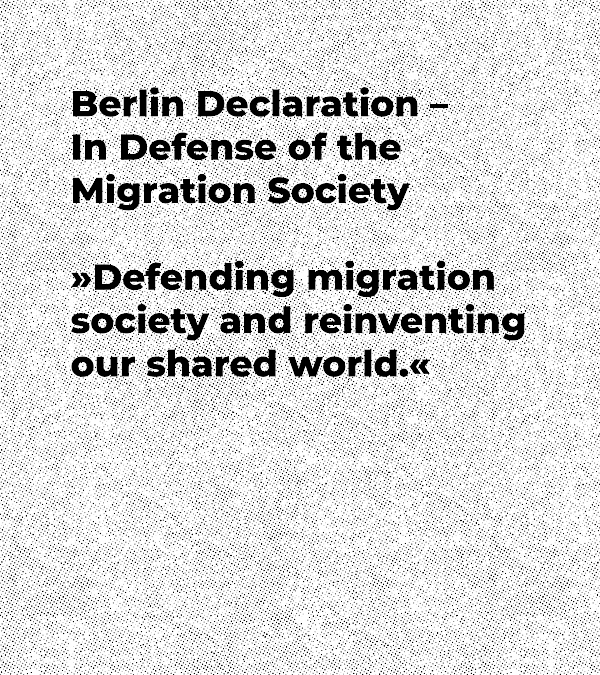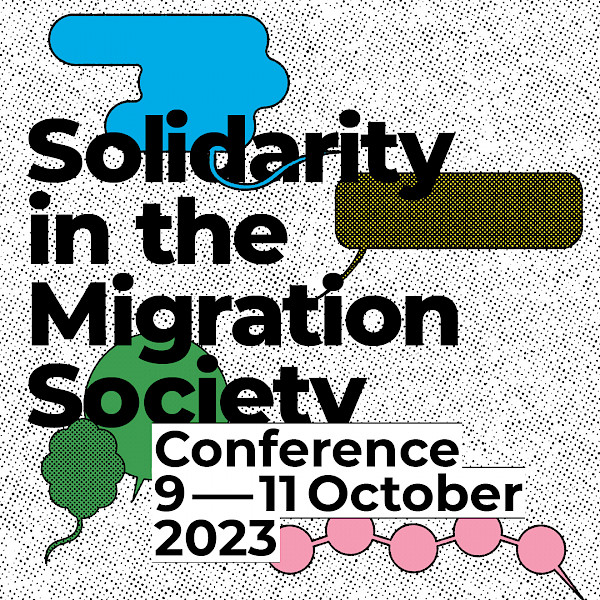»Berlin Declaration« – In Defense of the Migration Society
11.10.2023, BerlinWe hereby want to call on all actvists and advocates of migrant and refugee rights to sign the »Berlin Declaration« initiated by our friends from »Transforming Solidarities«.

»Berlin Declaration: In Defense of the Migration Society«
It is with increasing bewilderment that we have been following the ongoing questioning of the right to asylum in recent weeks and months. The sweeping defamation of those seeking protection has crossed the line into contempt for humanity. Now it is time to stand up and speak out in defense of the migration society.
The demands for the mass detention of refugees at Europe’s external borders, for the reintroduction of border controls in Europe, for compulsory work for asylum seekers, for the introduction of benefits in kind for refugees, and for stricter deportations not only repeat the migration policy mistakes of the past. They are first and foremost an attack on immigration societies in Europe. An attack on the way in which we have long lived together and in which we want to continue to live together.
This attack is not about ostensibly necessary measures to limit the movement of refugees to Europe. This cannot be achieved with the proposed tightening measures. It is also only ostensibly about relieving the burden on municipalities. In fact, funds for education, social services, culture, health, the fight against poverty and for women’s rights are being cut. The permanent and increasingly perfidious, fact-free scandalization of migration is continually pushing people out of our common world. A scandalization that also denies the history of migration and makes the people who have long since found their home here invisible.
This rhetoric fuels the desire not to have to share the world with others, and the willingness to enforce this by all available means. It fuels discourses and practices of division that distinguish between ›people like us‹ and others whose right to life and belonging can be disregarded. It fuels the illusion that a democracy can suspend human rights for some and still continue to function.
For this reason, we say clearly: Migration is not the problem. The problem is not that we live in a migration society. Migration has a history, a present and a future. What family in Germany, in Europe, is without a history of migration? People migrate. They set out and escape circumstances that tire them, that exhaust their strength and their imagination, that kill. People set out in the hope of finding something better than what they have to leave behind.
The problem is the scandalization of migration. The problem is that the aggressive and one-sided discourse about the supposed excessive burden placed on society by migration is intended to distract from the structural conditions and historical developments that have created the current polycrisis. The problem is that migration is instrumentalized to divide society. This exacerbates the currently experienced intensification of social debates and the overlaying of solidarity by hatred.
The consequences of the euro crisis are still being felt in the European fabric, the wounds of the Covid pandemic are far from healed, and the effects of the Russian war on Ukraine remain present. New wars, new attacks, and new conflicts are emerging daily. The polycrisis animates militarization and the increasingly bellicose management of conflict, with fatal geopolitical consequences. People are displaced, disenfranchised and exploited. The European project is on the brink of collapse because Europe is proving incapable of developing visions of global coexistence for the 21st century. Neither for the mobility of people nor with regard to the destruction of the climate, which we can already experience in our everyday lives. Already today, it is possible to foresee the upheavals that this will trigger globally.
A return to the national welfare state that seals itself off from the outside world and looks after its own on the inside is no answer to the challenges of our time. From a historical perspective, simple solutions have never worked. On the contrary, they have always been permeated by multiple exclusions, hierarchies and violence. At the same time, however, there has always been an unspoken but constant desire to secure and increase prosperity through contained migration.
This is even more true today. The attack on the migration society is accompanied by intensive efforts to create a new, selective recruitment policy. It follows the logistical dream of a targeted and state-controlled global recruitment of skilled workers, while at the same time denying refugees the opportunity to vocational training and and to taking up work.
But the national welfare state today is more than ever a phantasm. The once powerful infrastructures of services of common interest and public welfare, built in the name of solidarity, have long since been privatized in large parts or reorganized according to market economy logic. Social infrastructures in the municipalities have deteriorated in 30 years of austerity policy, have been sold off or deliberately dismantled. This applies equally to schools and swimming pools, to youth facilities and libraries, to care facilities and the train system.
Exploding rents, the inability to offer affordable and climate-neutral mobility solutions, and the decay of public infrastructure are only the obvious signs of a profound social crisis. The ideologies of nation, identity, and security are responding to the emergence of social movements that are carriers of new perspectives: Feminism, anti-racism, climate activism and uprisings against exploitation, indigenous organizing, migration and exile. It is therefore time to further revive the new and rediscovered practices of solidarity that are already emerging and to transform them into infrastructures of coexistence.
Migration and migration society are not responsible for the precarious situation of the common good in Germany and Europe. However, migration and migration society point out more strongly than ever that the major challenges of this century are global challenges. They must therefore also be addressed globally. Migration and migration society challenge us to rethink democracy, society and the common good. Because respect for the rights of migration is respect for the rights of all.
This is the challenge we face today: Defending migration society and reinventing our shared world.
Sign Now!
The declaration can be signed here!
